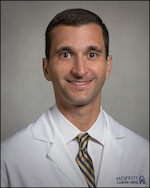Study: Anal Cancer Rates, Deaths Climbing In U.S.
Farrah Fawcett died because of it. Marcia Cross made headlines revealing it. Both famous leading ladies were diagnosed with anal cancer. Now, a study published in the Journal of the National Cancer Institute shows more Americans are being diagnosed with anal cancer. Death rates due to the disease are climbing as well.
Dr. Julian Sanchez, a colorectal surgeon at Moffitt Cancer Center whose research focuses on HPV infection and related anal cancers, said the findings point to the need for more people to consider getting vaccinated against HPV, the human papilloma viruses that are responsible for up to 90% of anal cancers.

Dr. Julian Sanchez, colorectal surgeon
The new study looked at anal cancer incidence and death rates in the U.S. from 2001-2015 using information from the U.S. Cancer Statistics dataset. Anal cancer diagnoses climbed 2.7% per year throughout the time period, potentially making it one of the most rapidly rising cancer diagnoses in the U.S.
Other findings showed that, for people in their 50s and 60s, the risk of being diagnosed with anal cancer that had spread elsewhere in the body more than doubled — as did the risk of dying from the disease. Black men born after the mid-1980s faced a five-fold increase of anal cancer compared to those born in the 1940s.
Sanchez said those findings are mirrored in the patient demographics he sees in Moffitt clinics. “We see an extraordinary amount of anal cancer here at Moffitt, largely because we have taken a clinical interest in its treatment,” said Sanchez. Though anal cancer can be aggressive, Sanchez noted it is most often treated with chemotherapy and radiation therapy alone.
The jump in anal cancer rates among young black men is most closely associated with those who are HIV positive, said Sanchez. “Young black men who are gay tend to have partners within their community and very few outside that community,” said Sanchez. This sets up a scenario in which an aggressive strain of HPV that causes anal cancer can eventually be shared with most members of the group.
The other population pointed out in the new study is also a growing group among Sanchez’s patients: middle-aged women. “We think that middle-aged women are developing anal cancer due to a latent HPV infection that they caught years ago, which is now becoming more aggressive and developing into cancer,” said Sanchez, noting that headlines made by Farrah Fawcett’s death and the revelation of Marcia Cross’ diagnosis have reduced the stigma attached to even discussing anal cancer.
While screening for anal cancer can be done using the same Pap smear that screens for lesions in the cervix, Sanchez noted there are no national guidelines for anal cancer screening even among those at elevated risk. He has worked to develop partnerships between Moffitt and community physicians and local health departments to encourage screening of high-risk individuals: those who’ve tested positive for HIV, men who have sex with men, and others whose immune systems may be compromised due to transplants or conditions like Crohn’s disease or rheumatoid arthritis that require immunosuppressive drugs. Like most adults, Sanchez explained, these individuals may have been exposed to the HPV virus earlier in life, and their weakened immune status can provide an opportunity for the dormant virus to develop into cancer. Those whose screening results indicate possible anal cancer are sent to Moffitt for further care.
Until screening guidelines are developed and adopted, everyone should be aware of signs that warrant further discussion with your doctor:
- Bleeding from the rectum
- Lumps or bumps in the rectal area
- Pain in the rectal area that does not resolve
Sanchez said the best advice is to discuss HPV vaccination with your physician. Age ranges for the HPV vaccine have been expanded to adults 45 years and younger. Even if you have already been infected with one of the more than 100 known strains of HPV, vaccination may still be worth your consideration. “The vaccine is not going to get rid of the virus,” explained Sanchez, “but it can prevent you from acquiring a new infection with one of the nine more aggressive strains covered by the vaccine.”


